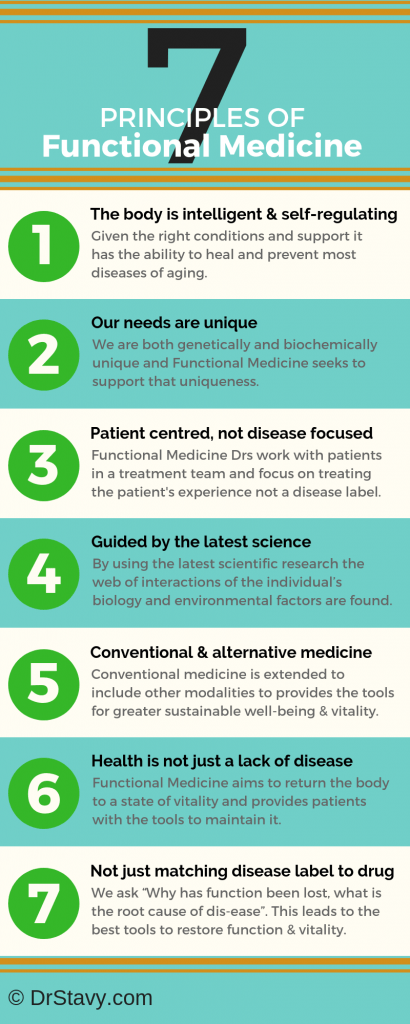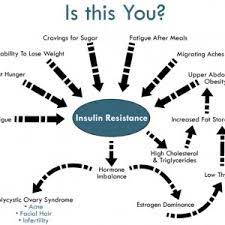What is Functional Medicine
In contrast with that the conventional health care medicine approach, which strives to diagnose disease and identify drug treatment, Functional Medicine takes an individualised approach to the treatment of disease by focusing on the identification and treatment of the sources of a person’s dis-ease to achieve optimal health.
Functional Medicine focuses on the patient and seeks the causes of disease and to treat the individual experiencing disease, having symptoms, loss or dysfunction and imbalances. The treatment uses a diverse toolkit covering nutritional, exercise, lifestyle counselling, and stress reduction techniques, alongside supplementation and conventional medication (if required).
While traditional medical treatment is generally very effective in the treatment of acute disease, infection and trauma, it struggles with effective treatment of chronic disease. Chronic conditions (e.g. Auto-immune disorders, Chronic Fatigue, Gastrointestinal issues and chronic musculoskeletal and neurological conditions) which rob their sufferers of quality of life and can cause mental health problems, are finding greater treatment success through complementary and alternative medicine such as functional medicine’s comprehensive, systemic approach.
Chronic health conditions respond to the Functional Medicine approach, where the functional medicine practitioner focuses on identifying and adding what is missing in the body and removing anything that prevents the body from achieving vital health.
7 Principles of Functional Medicine
- The body is intelligent & self-regulating – Functional Medicine believes in the power of the body and mind to create perfect health. Given the right conditions and support, it has the ability to heal and prevent most diseases of ageing.
- We are all individuals with individual needs – Both genetically and biochemically unique. Rather than treating symptoms Functional Medicine strives to support the individual’s body to trigger the natural healing mechanisms rather than just applying medication.
- Patient-centred, not disease-focused – A functional Medicine doctor will work with patients in a treatment team. It is understood that the patient’s involvement in treatment is the key to success. The patient is the centre of treatment, but also the centre of recovery. Instead of being passive recipients of treatment patients are encouraged to be completely involved in their treatment with their Dr in a supportive and individually focused environment. The team can also involve other practitioners – nutritionists, physical therapist.
- Guided by the latest science – By using the latest scientific research Functional Medicine practitioners can see the complicated web of interactions of the individual’s biology and environmental factors. Understanding these relationships enables the current functioning of the body to be understood and the best treatment path identified.
- Traditional Medicine, Eastern, integrative & alternative medicine combined for a holistic approach – This extended toolkit provides patients with the tools and support for truly sustainable health to include mind body and spirit.
- Health and wellness not just a lack of disease – Functional Medicine aim to return the body to a state of vitality and provides the patient with the tools to maintain it.
- Not just about matching a disease label to a drug – The root of the problem is identified by asking “Why has function been lost, what is the root cause of dis-ease”. This question leads us to the best tools to be used to restore this lost function using a holistic approach to health.

What can Functional Medicine help with?
It is common for western medicine to miss hormonal and nutrient imbalances leaving patients suffering.
Functional medicine doctors treat the whole of you until your symptoms are gone.
Adrenal Fatigue
It is common for chronic stress, not enough sleep and poor diet to overstimulate your adrenal glands, disrupting your hormones, and causing debilitating pain and fatigue. You can find more information about adrenal fatigue in our blog.
Hypothyroidism
A suboptimal thyroid will not be able to produce the amount of thyroid hormones your body requires, resulting in weight gain, fatigue, muscle weakness, high cholesterol, joint pain or stiffness, and sometimes depression. You can find more information about how functional medicine can help with hypothyroidism in our blog.
Fibromyalgia
Fibromyalgia, a chronic muscle shortening, can stimulate the brain to experience extreme pain, stiffness and recurring infections.
Arthritis
Inflammation of one or more joints causes pain, stiffness and immobility.
Small Intestine Bacterial Overgrowth (SIBO)
Food fermentation can cause severe postprandial bloating and altered bowel habits. You can find more information about SIBO in our blog.
Read More about the functional medicine approach to SIBO
Crohn’s Disease
Crohn’s disease can cause abdominal pain, severe diarrhoea, fatigue, weight loss and malnutrition as a result of inflammation of the digestive tract.
Hormonal Imbalances
Hormonal imbalances can occur in both men and women and are called Andropause and Menopause, respectively.
Polycystic Ovary Syndrome
PCOS is a hormonal disorder that can cause infrequent or prolonged menstrual periods or excess androgen levels, and irregular release of eggs by ovary follicles.
What is a Functional Medicine Doctor & Practitioner?
A Functional Medicine doctor restores normal physiology and normal body “Function” rather than focusing on the treatment of specific diseases. We find, in general, that if we can restore normal body function that most disease processes clear up. So then, what is a Functional Medicine practitioner? Ok, that question takes some explaining.
In a sense, Functional Medicine is an area of speciality unto itself. So you could have a medical doctor that practices medicine, internal medicine or geriatric medicine, paediatric medicine or oncology AND practices Functional Medicine also. You could have a nurse practitioner or chiropractor or acupuncturist or naturopath that practices nursing, chiropractic, acupuncture or naturopathy AND alongside that practices Functional Medicine. You’ll have some physicians that only practice Functional Medicine and cease to use their original training. Most docs combine whatever their original training was with the Functional Medicine model.
What do Functional Medicine doctors do in terms of initial workups?
Most follow a similar path. There is an initial new patient consultation, typically an hour or longer where they take a complete history, not just a medical history but a history of your life stresses, working to find the original underlying cause of the health problems you are experiencing rather than solely focusing on your current symptoms. All Functional Medicine doctors will order various types of labs, some used in conventional medicine but unique to our field. Specialized GI assessments for your microbiome, measuring nutrient levels, amino acid levels, organic acids for brain health the liver detoxification pathways. SNP testing or genetic testing is common as is food allergy testing along with a variety of hormone assays.
What does a functional doctor do?
The most important emphasis is placed on the primary prevention of disease (before the disease process has begun). There is much wisdom in the old adage “an ounce of prevention is worth a pound of cure”. Once a disease process has started, a determination is made as to which core clinical function is imbalanced and responsible for causing it. Most functional imbalances can be addressed, some substantially improved (treated) and others completely returned to optimal function (healed). Rebalancing core clinical functions always have a significant positive impact on the health of the patient. A large toolbox of available interventions are evaluated and a customized treatment plan is applied for maximal impact on the underlying functionality.
Functional medicine expands the physician’s toolbox beyond pharmaceuticals and surgery. It also includes botanicals, supplements, therapeutic diets, exercise plans, functional neuro-rehabilitation, detoxification programs, stress management techniques and much more.
The physician and patient become active partners. Such a partnership allows the patient to truly be in control of improving their health and achieving optimal wellness.
FUNCTIONAL MEDICINE VS. CONVENTIONAL MEDICINE
Functional Medicine
INVESTIGATE
It treats symptoms by addressing the underlying cause of the problem, which leads to more profound and longer-lasting results.
HOLISTIC
Treats the body as an interconnected whole, and recognizes the importance of these connections in health and disease.
SAFE
Treatments have mild or no side effects, and other unrelated complaints often improve spontaneously.
PATIENT-CENTERED
Treats the patient, not the disease. Treatments are highly individualized based on patient needs.
PARTICIPATORY
The patient is respected, empowered, educated and encouraged to play an active role in the healing process.
INTERROGATIVE
Combines the best of both modern and traditional medicines and emphasizes the importance of diet and lifestyle.
RESTORATIVE
Tests and treatments designed to promote optimal function, prevent and reverse disease, and improve quality of life.
PREVENTATIVE
Guided by Hippocrates, the father of medicine’s, saying to “let food be thy medicine, and medicine thy food”.
EVIDENCE-BASED
Based on the latest research from peer-reviewed medical journals, and uncorrupted by corporate and political interests.
Conventional Medicine
SUPERFICIAL
Masks or suppresses symptoms, but does not address the underlying cause, which creates “patients for life”.
DUALISTIC
Views the body as a collection of separate parts, each of which has its own doctor (i.e. cardiologist, podiatrist, etc.)
SIDE EFFECTS
Treatments can have side effects and complications.
DISEASE-CENTERED
Treats the disease, not the patient. Patients with the same disease get the same treatment, regardless of their differences.
AUTOCRATIC
The patient’s opinion is often discounted or ignored, little time is spent on education, and the patient may be discouraged from playing an active role.
LIMITED
Relies almost exclusively on drugs and surgery, in spite of their risks and complications.
PALLIATIVE
Tests and treatments designed to prevent death and manage serious disease, without dealing with the underlying cause.
REACTIVE
Focused on managing disease after it has already reached an irreversible state.
PROFIT-DRIVEN
Heavily influenced by profit-driven pharmaceutical and insurance companies.
Functional Medicine Doctor
— Dr S Nikitopoulou – General Medical Practioner (GMC Reg: 6092503) London based Homeopath.
Dr Stavy Nikitopoulou is a General Practitioner (GP) and Functional Medicine Doctor/ (Homeopathic and Medical Acupuncturist Doctor), double board-certified in Internal and Integrative Medicine. Dr Stavy is specialized in finding the root cause of complex health conditions and developing individualized, patient–centred plans using evidence-based Western and Eastern Medicine.


